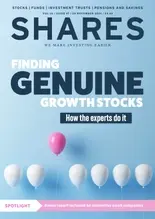
Stocks in London edged lower on Friday, while equities in New York dropped in early trade following some hawkish comments from the chair of the US Federal Reserve.
The FTSE 100 index lost 7.58 points, 0.1%, at 8,063.61. The FTSE 250 declined 46.17 points, 0.2%, at 20,476.64, and the AIM All-Share gave back 2.24 points, 0.3%, at 727.14.
For the week, the FTSE 100 slipped 0.1%, the FTSE 250 declined 0.2% and the AIM All-Share shed 1.0%.
The Cboe UK 100 ended down 0.1% at 810.98, the Cboe UK 250 rose 0.2% to 17,990.63, and the Cboe Small Companies added 0.7% at 15,852.72.
In European equities on Friday, the CAC 40 in Paris ended 0.6% lower, while the DAX 40 in Frankfurt declined 0.3%.
The pound was quoted at $1.2639 late on Friday afternoon in London, down compared to $1.2713 at the equities close on Thursday. The euro fell to $1.0538, against $1.0576. Against the yen, the dollar was trading lower at JP¥154.72 compared to JP¥155.81.
Fed Chair Jerome Powell supported a gradual approach to lowering interest rates, saying the US central bank does not need to be ‘in a hurry’ given a strong economy and after making progress in lowering inflation.
‘The economy is not sending any signals that we need to be in a hurry to lower rates,’ Powell said. ‘The strength we are currently seeing in the economy gives us the ability to approach our decisions carefully.’
‘The recent performance of our economy has been remarkably good, by far the best of any major economy in the world,’ he added.
In New York, the Dow Jones Industrial Average was down 0.5% at the time of the closing bell in London. The S&P 500 was 1.1% lower and the Nasdaq Composite slumped 1.9%.
‘The post-election rally hit a brick wall overnight after Fed Chair Jerome Powell delivered a dose of ’unvarnished truth,‘ hinting that economic strength might warrant patience on future rate cuts. This was a cold splash of reality for equity traders, who were already loaded up to an 11-year high in U.S. stocks post-Trump victory,’ SPI Asset Management analyst Stephen Innes commented.
In London, healthcare stocks were perturbed by a US President-elect Donald Trump pick for his cabinet.
Trump on Thursday tapped anti-vaccine activist and conspiracy theorist Robert F Kennedy Jr. as his secretary of health in the latest provocative nomination from the incoming Republican president.
GSK fell 3.9% and AstraZeneca shed 3.1%.
TT Electronics confirmed it rejected a Volex takeover proposal, with a higher bid from a third party also being declined.
Shares in the manufacturer of electronic components jumped 41%.
It said it rejected the unsolicited Volex approach as ‘fundamentally undervaluing TT Electronics and its long-term prospects’.
TT added that it recently rejected an all-cash indicative offer from an unnamed party at a significantly higher value than presented by the Basingstoke, Hampshire-based specialist integrated manufacturer of critical power and data transmission products.
Earlier on Friday, Volex revealed it had made two takeover offers for TT Electronics, but said TT’s board has refused to engage in talks.
Volex shares slumped 11%.
China-exposed shares ended higher, on promising retail sales in the Asian nation. Miners Anglo American added 1.6%, Asia-focused insurer Prudential rose 1.8% and lender HSBC climbed 1.5%.
China’s retail sales last month grew at their fastest clip since the start of the year, official figures showed Friday, an encouraging sign for Beijing as it looks to boost sluggish consumption.
Officials have since late September unveiled a slew of measures including interest rate cuts and debt swaps intended to boost activity in the world’s second-largest economy, which has struggled to regain momentum since the pandemic.
Among the woes facing policymakers are slumping domestic consumption resulting in deflationary pressure, a property sector bust and geopolitically fraught trade disputes.
Retail sales expanded 4.8% on-year in October, the National Bureau of Statistics said, speeding up from the 3.2% in September.
The reading also significantly outperformed the 3.8% forecast in a Bloomberg survey of analysts and represents the best reading since February.
Data from the UK was less emphatic. UK gross domestic product edged up 0.1%, missing the 0.2% consensus, and slowing from 0.5% seen between April and June, according to the Office for National Statistics.
‘The engine of the UK economy, services, rose by a mere 0.1% last quarter, while construction jumped by 0.8%. However, the main culprit was manufacturing, and there were declines across most manufacturing sub sectors in the three months to September,’ XTB analyst Kathleen Brooks commented.
‘There was some good news, the report showed a rise in private consumption, and strong fixed capital formation, or investment. Total business investment was also strong, rising at a 1.2% quarterly rate. This could help to trigger growth down the line. However, at first glance, this GDP report supports the view of both the OBR and the BOE that the UK economy is a high spending, low growth economy as we move towards the end of 2024.’
Brent oil was quoted lower at $72.08 a barrel late on Friday afternoon, down from $72.43 at the time of the London equities close on Thursday. Gold was quoted lower at $2,569.63 an ounce against $2,576.68 on Thursday.
Monday’s economic calendar is quiet, before the week picks up with a eurozone inflation reading on Tuesday and UK consumer price index data on Wednesday.
Monday’s local corporate calendar has half-year results from self storage provider Big Yellow Group.
Copyright 2024 Alliance News Ltd. All Rights Reserved.




